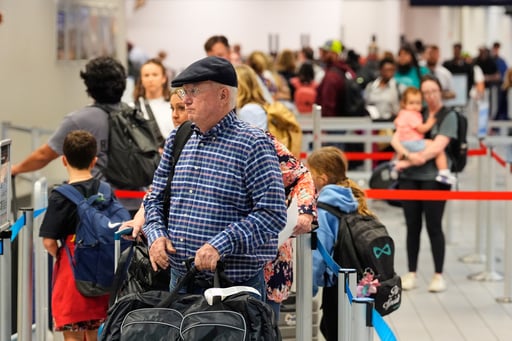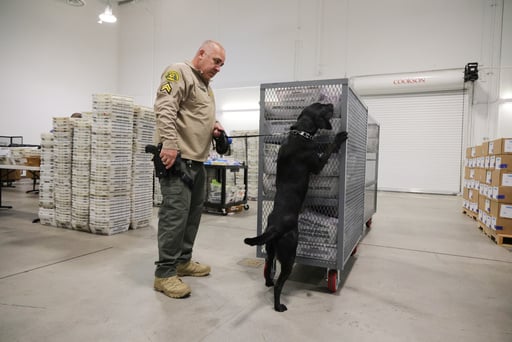The shutdown is over. Flights have resumed. Thanksgiving travelers might wonder: What now?
The turbulence caused by the longest government shutdown on record may still be fresh on travelers’ minds this Thanksgiving, but experts say preparing for the usual holiday crush of winter weather, heavy traffic and crowded airports can help ease those jitters.
“I think the shutdown at this point is history for air travel. The airlines understand this time of year so well. They know exactly what they need to do,” said Sheldon H. Jacobson, an airport and airlines operations expert. “The real challenge is making sure travelers can help themselves.”
Here’s a guide to navigating the busiest travel week of the year:
How busy could it be?
Travel forecasts point to packed airports and roads.
A week after lifting the unprecedented flight restrictions it placed on commercial airlines during the shutdown, the Federal Aviation Administration is preparing for its busiest Thanksgiving week in 15 years, with more than 360,000 flights scheduled between Monday and next Tuesday. That’s more than 17.8 million people who will be screened by the Transportation Security Administration.
AAA projects 1.3 million more travelers will be on the roads than last year, pushing the total number of people traveling by car to at least 73 million.
Winter weather
You can’t control the weather, but you can control how prepared you are if a winter storm hits. If your flight is canceled or delayed, will you drive instead or postpone or cancel your trip? Knowing your options ahead of time can reduce stress if a storm leaves you stranded.
James Belanger, vice president of meteorology at the Weather Company, recommends checking the forecast frequently while planning your trip.
The Weather Channel offers a Thanksgiving weekly forecast highlighting major airports and highways that could be affected by bad weather — including snow, ice and rain — along with a free online tool that shows how the weather might impact your travel route.
On Tuesday, the FAA’s busiest day with more than 52,000 flights scheduled, forecasters say rain could cause problems in the Pacific Northwest and for much of the eastern U.S. Airports in Atlanta, Chicago, New York, Philadelphia, Seattle and Washington, D.C., could be impacted, according to the Weather Channel.
What to pack (and what to skip)
Jacobson, whose research contributed to the design of TSA PreCheck, recommends starting your packing by unpacking.
Check every pocket in case TSA-restricted items, like full-sized bottles, were left behind from a previous trip. This simple scan can help you get through security faster, especially when airports are crowded.
If you’re traveling with gifts, Jacobson suggests wrapping them at your destination because TSA agents may need to open them.
When deciding which clothes and shoes to pack, Belanger says to check the “feels like” temperature for a better sense of the weather, especially if you’re not used to the cold.
And don’t forget a REAL ID is required to fly within the U.S., or you’ll need to bring another accepted form of ID, like a passport or military ID.
People with iPhones can now also add their U.S. passport details to Apple Wallet, which can be scanned at participating airports if travelers don’t have a REAL ID. More than a dozen states already accept some form of a mobile ID at airport checkpoints, and travelers can go to the TSA website for more details.
Road trip ready
Whether driving is your top choice or backup plan, AAA spokesperson Aixa Diaz suggests checking your tires, car battery and fluids, then hitting the road with a full tank of gas as early as possible to avoid traffic. Last year, AAA said, it responded to nearly 600,000 emergency roadside assistance calls during the Thanksgiving travel period to help drivers stranded by dead batteries, flat tires and empty tanks.
According to an analysis by Google Maps:
— Traffic on Wednesday is expected to be 14% heavier than usual between 10 a.m. and 4 p.m., with peak traffic from 1 p.m. to 3 p.m.
— On Thanksgiving Day, the roads will be busiest between noon and 3 p.m.
— When it’s time to head home, avoid driving from 12 to 3 p.m. on Saturday and Sunday, when traffic is heaviest.
The best passenger
“…is an informed passenger,” Jacobson likes to say.
Download your airline’s app to track your flight status, and check it regularly as your travel date approaches. That way, if your flight is canceled the day before, you can quickly look for alternatives.
Driving or flying, leave earlier than you think you need to. Knowing you won’t have to rush to your destination can help calm any nerves, whether it’s lingering anxiety from the shutdown or because you’re traveling with young kids or someone who needs extra help getting around.
“These are some very simple things to think about, but they’re important things to think about,” Jacobson said.



